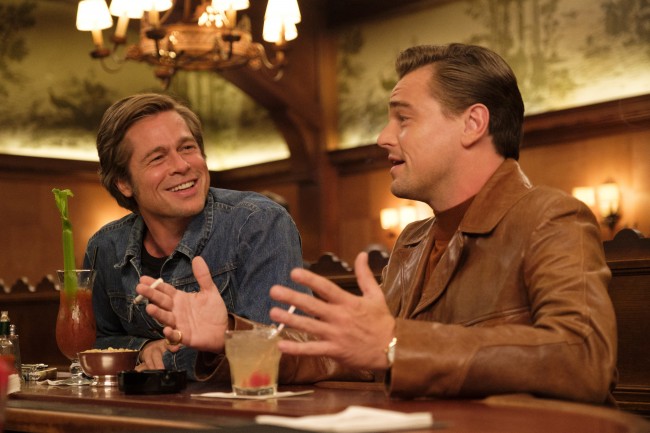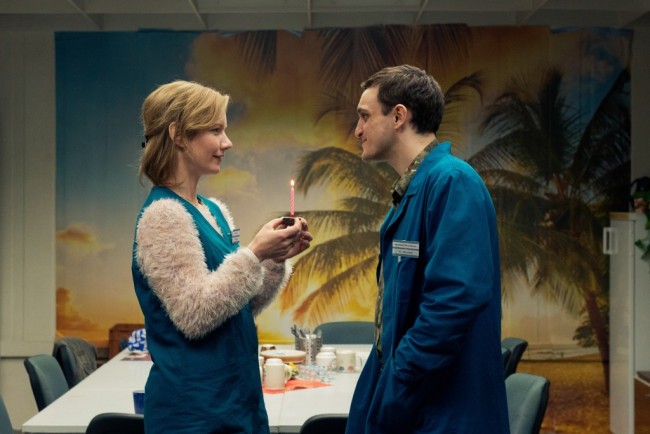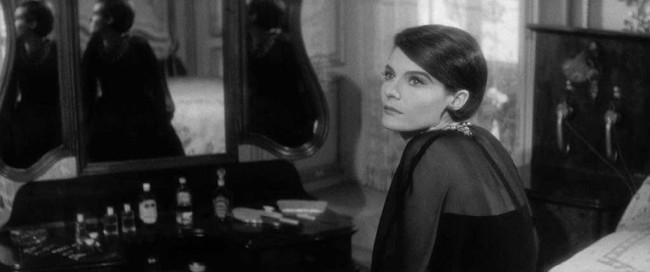Movie City Indie
Screenplays FYC 2019
After The Wedding
Booksmart
Downton Abbey
The Farewell
Frankie
Harriet
Hustlers
The Lighthouse
Pain and Glory
The Song of Names
Us
Waves
Dad Star Man: A Review Of AD ASTRA

What if there was intelligent life at the farthest reaches of the studio system?
Fully a fable, a chamber piece within outer space, “Ad Astra” is flint and lyric: the search for self, the search for God, the transformation of thought into light playing off an iconic face in close-up against the bold but airless light of a greater universe. James Gray’s marvel of a paranoid thriller, antagonistically serene, otherworldly yet wholly concrete is an uncommon attainment of visual and sonic beauty, ready and ripe to be madly misunderstood. In this near future, the moon is colonized and is a waystation to travel to Mars and, clandestinely, beyond. Brad Pitt is mid-career astronaut Roy McBride, forever in the penumbra of his father, H. Clifford McBride (Tommy Lee Jones), who, the space agency attests, vanished nearly three decades earlier as part of the Lima Project, a top-secret experiment that nestled in the rings of Neptune. (Their goal had been to sense intelligent life beyond the edge of human attainment.) Roy is self-contained: taciturn, calm, hardly winded by the worst of physical and psychological challenges. He’s summoned after a global “Surge”: power strikes, cosmic rays blast from the heavens and kill tens of thousands. Could his decades-absent father be alive, a terrorist hurling the fire of antimatter, reveling in unsound methods? [Read more.]
Grown Goonies In The Boonies: A Review of IT Chapter 2

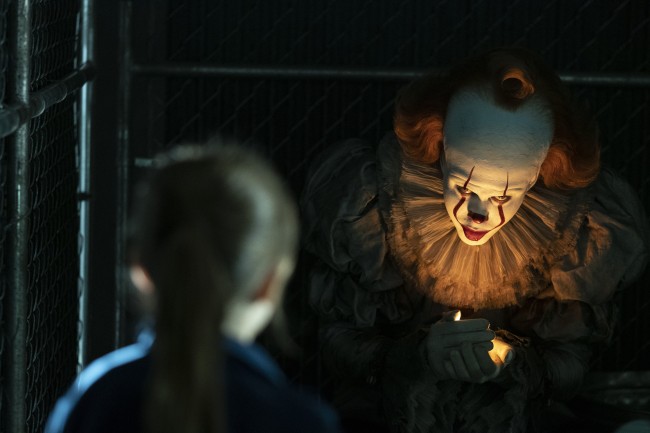 “IT” has… stuff. [Mild spoilers.] You know if you want to see it, and if you want to see it, you’ll see it, and if you have reservations about seeing it, IT Chapter 2, or, “Grown Goonies in the Boonies,” is likely not for you.
“IT” has… stuff. [Mild spoilers.] You know if you want to see it, and if you want to see it, you’ll see it, and if you have reservations about seeing it, IT Chapter 2, or, “Grown Goonies in the Boonies,” is likely not for you.
Set in a visually undistinguished edition of Stephen King’s Maine-of-the-mind, the further deaths by misadventure of the make-it-up-as-you-go-along clown Pennywise should creep or repulse only the most devoted fans of the 2017 original or the most hidebound of coulrophobics. (Fan service and callbacks be thy curse.) Twenty-seven years after the doings of the $700 million worldwide-grossing adaptation of the early going of King’s 1,138-page skull-cracker, the Losers’ Club grown large, which once defeated the spectral murderer Pennywise, return to Derry in 2016 for a final bout. The opening hate crime-turned-murder that signals the return of the nightmare creature ends with a skyful of red balloons about as haunting as a pile-on of emojis rising from on Instagram on someone’s birthday. (The preceding torture and death goes on a good while, and includes extremely crunchy sounds of bodily harm.) [Read more.]
Friday Movies: ONCE UPON A TIME …, Fassbinder Trilogy on Blu; Why FLORIDA PROJECT on 35mm?

ONCE UPON A TIME … IN HOLLYWOOD. Quentin Tarantino’s melancholy pop-rocket picaresque Once Upon a Time … in Hollywood is the truest of true “hang-out” movies: key characters spend the greater part of their screen time getting from one place to another, wandering blissfully, even wantonly to an incessant song score, across a delirious period landscape, a wholly realized world. It’s also a Western, a war movie, and a snow globe, shaken now and again, of Tarantino’s fascination with the filmmaking process.
A swarming cast crosses the fates of three characters over three days in another time: Rick Dalton (Leonardo DiCaprio, hilarious and tragic, too), a stammering falling star with a drinking problem; his stunt double-turned-body man/dogsbody, Cliff Booth (Brad Pitt embodying epic sangfroid), who has a knack for abrupt violence—“More than a brother but less than a wife” and Rick’s neighbor, Sharon Tate (Margot Robbie, archetypal yet human, so human), a young actress who competes with the inexorable Southern California sunshine [Read More.]
THE BRD TRILOGY on Blu. A single, singular, boldly prolific filmmaker was an unstoppable force at the turn of the eighties, much as Godard had been in the early sixties when he turned out tasty, provocative film essays a couple times per annum. But Rainer Werner Fassbinder, the most prolific of the 1970s German New Wave directors, went out with his bad-boy image intact when he died thirty-seven years ago (at the age of thirty-seven), slumped over a flatbed editing machine after yet another long day of dogged work, plentiful cigarettes, bountiful beer, intermittent barbiturates, a taste of Jack Daniel’s and more than a tincture of cocaine. At the center of Fassbinder’s output were twenty-eight stage plays and forty-three or so films, including the magnificent parable of postwar German life, The Marriage of Maria Braun, and the epic fifteen-and-a-half-hour Berlin Alexanderplatz. [Read More.]
THE FLORIDA PROJECT. Sean Baker’s effortlessly headlong dive into a child’s imagination is a tender thunderclap, brisk, observant, funny, and built upon the writer-director’s customary attention to issues of class, and more specifically, the underclass. (It remains my choice for the best American feature film of 2017.) The Chicago Film Society hosts a premiere of a 35mm print of the movie, with Baker on hand. “Florida Project” was shot on film, but distributed in the standard DCP format. [Read More.]
2 Comments »Friday Movies: MIDSOMMAR, THE JUNIPER TREE, THE CURE, COOKED

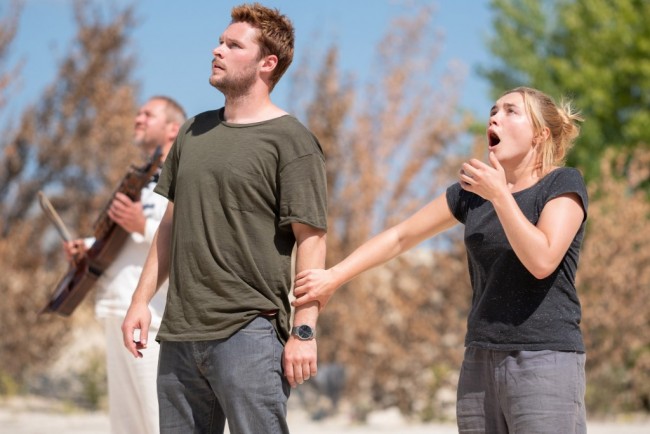 Midsommar. Oh, shit: shit happens. Or “Holy shit, right?” as a doofus American laughs in writer-director Ari Aster’s second feast of grief, the anthropo-horror Midsommar, it’s not good grief, it’s grievous goodness: pain is protracted, agony prolonged, and so much of it is a manifestation of what is simmering inside its troubled central couple. Then the unforeseen pagan mysteries revealed under the midnight sun blow it up to nightmare scale. It’s also blackly funny, down to the brutal and extravagant final shot: a perverse post-Falconetti close-up that is both magisterial and hilarious. A character arrives, is anointed: avaricious beauty and brute malice make a final floral gesture. Aster’s detail-drenched, languorous, even ponderous follow-up to Hereditary is multitudes. [Read more.]
Midsommar. Oh, shit: shit happens. Or “Holy shit, right?” as a doofus American laughs in writer-director Ari Aster’s second feast of grief, the anthropo-horror Midsommar, it’s not good grief, it’s grievous goodness: pain is protracted, agony prolonged, and so much of it is a manifestation of what is simmering inside its troubled central couple. Then the unforeseen pagan mysteries revealed under the midnight sun blow it up to nightmare scale. It’s also blackly funny, down to the brutal and extravagant final shot: a perverse post-Falconetti close-up that is both magisterial and hilarious. A character arrives, is anointed: avaricious beauty and brute malice make a final floral gesture. Aster’s detail-drenched, languorous, even ponderous follow-up to Hereditary is multitudes. [Read more.]
The Juniper Tree.The weight of the Icelandic landscape startles and captivates as it embraces and punishes its female characters; Björk, twenty-one, is sound and vision, grounded and ethereal at the very beginning, as she is to this day. [Read more.]
The Cure–Anniversary 1978-2018 Live In Hyde Park London. If a band’s gonna go through four decades of shamanistic repetition, these are dandy, candy incantations. [Read more.]
Cooked: Survival by Zip Code. Revising the 1995 heat wave that killed hundreds of Chicagoans, mostly poor, mostly black. Urgent questions, asked crisply and well.[Read more.]
Friday Movies: LAST BLACK MAN IN SAN FRANCISCO; DO THE RIGHT THING; ROLLING THUNDER REVUE; DEAD DON’T DIE; GARRY WINOGRAND; IN THE AISLES

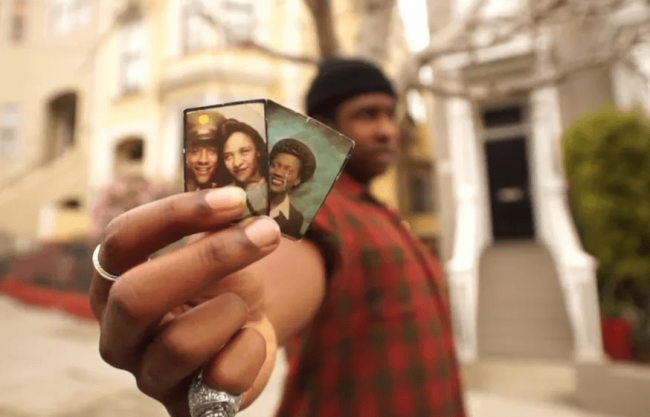 The Last Black Man In San Francisco. Some movies you walk into knowing nothing and upon leaving, you feel in at least some way you know everything. Joe Talbot’s luminous, mesmeric The Last Black Man In San Francisco is a temporal-topographical dreamspace of sweet hallucination. Its characters’ wants are simple: Jimmie (Jimmie Fails) wants a Victorian home built long ago by his grandfather in the heart of San Francisco. [Read more.]
The Last Black Man In San Francisco. Some movies you walk into knowing nothing and upon leaving, you feel in at least some way you know everything. Joe Talbot’s luminous, mesmeric The Last Black Man In San Francisco is a temporal-topographical dreamspace of sweet hallucination. Its characters’ wants are simple: Jimmie (Jimmie Fails) wants a Victorian home built long ago by his grandfather in the heart of San Francisco. [Read more.]
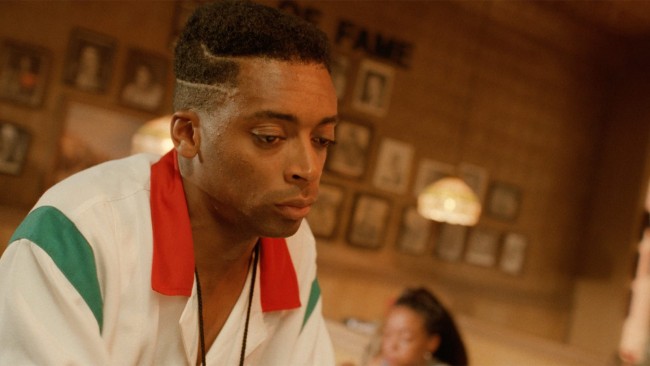 Do The Right Thing.“Well, here’s the thing, though,” Spike Lee said way back in February 2019, promoting BlacKkKlansman via Politico, “and this is the biggest criticism of Do the Right Thing: ‘Spike Lee, he didn’t provide the answer to racism! To prejudice!’ That was 1989, and I’m not going to start in motherfucking 2019. That’s not my job. To show what the fuck is happening. And hopefully, through dialogue or whatever, people see what the hell is going on. But I will not sit in front of this microphone staring at the Capitol Building and tell you that Spike Lee has an antidote to cleanse the world of hate, and racism. I won’t do that. It’ll be a lie. I don’t have the answer.” Here’s a question though: have you seenDo the Right Thing”? Have you seen Do the Right Thing recently? Here’s your chance to see it in 35mm, a startling, electric creative dispatch from yesterday, and maybe even the future. [Read more.]
Do The Right Thing.“Well, here’s the thing, though,” Spike Lee said way back in February 2019, promoting BlacKkKlansman via Politico, “and this is the biggest criticism of Do the Right Thing: ‘Spike Lee, he didn’t provide the answer to racism! To prejudice!’ That was 1989, and I’m not going to start in motherfucking 2019. That’s not my job. To show what the fuck is happening. And hopefully, through dialogue or whatever, people see what the hell is going on. But I will not sit in front of this microphone staring at the Capitol Building and tell you that Spike Lee has an antidote to cleanse the world of hate, and racism. I won’t do that. It’ll be a lie. I don’t have the answer.” Here’s a question though: have you seenDo the Right Thing”? Have you seen Do the Right Thing recently? Here’s your chance to see it in 35mm, a startling, electric creative dispatch from yesterday, and maybe even the future. [Read more.]
Rolling Thunder Revue: A Bob Dylan Story By Martin Scorsese. “That’s all clumsy bullshit,” the elder Bob Dylan says at the outset of the thrilling put-on and picaresque “Rolling Thunder Revue: A Bob Dylan Story By Martin Scorsese.” Scorsese’s own opening gambit is a slap of turn-of-the-twentieth century special effects by Georges Méliès, of disappearance-reappearance special-effects prestidigitation: you see the body; the form is obscured; the body returns. (A form of Gypsy Rose Lee’s key rule for the stripper’s calling, if you will: reveal, conceal.) [Read more.]
The Dead Don’t Die. Jim Jarmusch’s zombie apocalypse “The Dead Don’t Die” is a simmering if relaxed addition to his canon of understated pictures. Reviewers have roundly misunderstood its genial but not ineffectual slapstick and low japery (especially after the placid tonal mastery of “Paterson”). “Dead Don’t” is both a shrug and a muffled howl of rage that cannot find catharsis. “It definitely has a sociopolitical thread in it, which is reflective and therefore dark,” Jarmusch told Bilge Ebiri at Vulture. “But hey, everyone, wake up! We’re in the sixth mass extinction on this planet. To not have that darkness would have been a little superficial.[Read more.]
Garry Winogrand: All Things Are Photographable. Curator John Szarkowski called Garry Winogrand “the central photographer of his generation”; Winogrand called himself “a city hick from the Bronx.” Sasha Waters Freyer’s rich, bustling documentary, “Garry Winogrand: All Things Are Photographable” (Kino Lorber DVD), captures the vitality of this street photographer eye-omnivore and the range of what the world at large transmitted to his roving gaze. [Read more.]
In The Aisles.Through tenuous romance and observant details, which the film’s producer nods to as “poetic realism,” Thomas Stuber offers a showcase for the charm and emotional range of his actors, including Franz Rogowski (Transit) and Sandra Hüller (Toni Erdmann) whose flirtations start and stop and perhaps start again. The fragrance of the everyday rises without perfume. [Read more.]
Friday Movies: ROCKETMAN, THE SOUVENIR, LAST YEAR AT MARIENBAD,THE BRINK

Rocketman. Rocketman, the biopic-jukebox musical strung upon the outpouring of songs written by Elton John and Bernie Taupin, is saved from its chock-a-block narrative impatience by the pure puppy-ness of Taron Egerton’s performance as Reg Dwight grown big and awful, rocketing toward his present twenty-eight years of sobriety. Camp is indicated more than embodied: the phantasm of Elton John’s feelings, both sad and flying high, plays as a deracinated version of a Baz Luhrmann canvas like Moulin Rouge than the Ken Russell bacchanal that would have incinerated the screen. (The script is by Lee Hall, who collaborated with John on the stage musical adaptation of his highly political Billy Elliot screenplay.) [More here.]
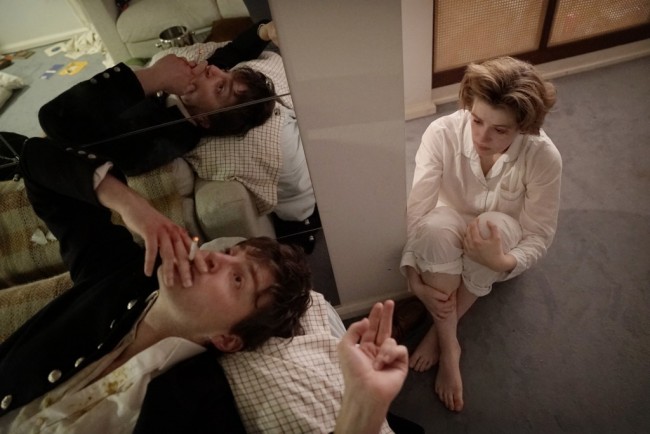 The Souvenir. Joanna Hogg’s The Souvenir is as mysterious as it is specific, tracing the drift of Julie, an intensely ambitious film student (Honor Swinton Byrne) who is distracted by a first true love affair, with Anthony (Tom Burke), a man who appears to take her seriously indeed. Set in the 1980s artistic era in which the writer-director grew up, Hogg’s fourth feature describes how a film narrative can flow around the range of thoughts and emotions that a shy young woman holds as she hopes to make art. Places and faces are equally expressive realms. Can imagination be mere delusion? What are her dreams? Hogg dreamt them, dreams them, again, as distanced onscreen memoir, and the dream is furthered by Byrne’s mesmerizing, fleeting performance. “Making the film, I’m allowing parts of my own biography to be re-imagined and expanded upon and changed,” Hogg has said. “I want it to become something else.” [More here.]
The Souvenir. Joanna Hogg’s The Souvenir is as mysterious as it is specific, tracing the drift of Julie, an intensely ambitious film student (Honor Swinton Byrne) who is distracted by a first true love affair, with Anthony (Tom Burke), a man who appears to take her seriously indeed. Set in the 1980s artistic era in which the writer-director grew up, Hogg’s fourth feature describes how a film narrative can flow around the range of thoughts and emotions that a shy young woman holds as she hopes to make art. Places and faces are equally expressive realms. Can imagination be mere delusion? What are her dreams? Hogg dreamt them, dreams them, again, as distanced onscreen memoir, and the dream is furthered by Byrne’s mesmerizing, fleeting performance. “Making the film, I’m allowing parts of my own biography to be re-imagined and expanded upon and changed,” Hogg has said. “I want it to become something else.” [More here.]
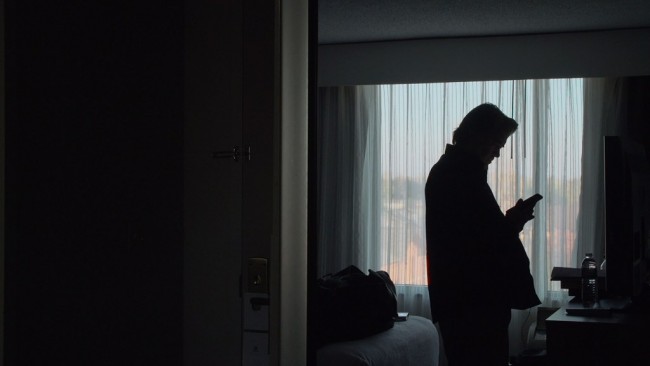 The Brink. Alison Klayman’s The Brink, an avatar of cinema-vérité observation, arrives in a hush and escalates with precision. Klayman records political consultant and purported intellectual powerhouse Stephen K. “Steve” Bannon after his dismissal from the arms of Trump power, and the rich result, captured by a filmmaker-cinematographer-sound recordist on their own, all on their own, is edited to a fierce ninety-minute form from day-after-day of close observation of a year in a life of wheeling and huffing and dealing and puffing. [More here.] iTunes, June 4.
The Brink. Alison Klayman’s The Brink, an avatar of cinema-vérité observation, arrives in a hush and escalates with precision. Klayman records political consultant and purported intellectual powerhouse Stephen K. “Steve” Bannon after his dismissal from the arms of Trump power, and the rich result, captured by a filmmaker-cinematographer-sound recordist on their own, all on their own, is edited to a fierce ninety-minute form from day-after-day of close observation of a year in a life of wheeling and huffing and dealing and puffing. [More here.] iTunes, June 4.
Last Year At Marienbad. [4k restoration; Criterion Blu upgrade.] Furiously beautiful and fatefully unforgettable, Alain Resnais’ Last Year at Marienbad (L’année dernière à Marienbad), released in 1961 and written by Alain Robbe-Grillet in an absurdly detailed screenplay, is of its time. Its greatness lies in being a riotous puzzle box with silken and sheer and shiny surfaces that should dazzle, somewhat comforting in their concreteness as figures and objects, but discomfiture of memory and time and dream in its very form. A fantastic world of impossible wealth and improbable ennui and sculptured hair and Coco Chanel couture tacking through castle and courtyard in the shapeliest but least-definable of waking dreams: it is a thundercrack. (Robbe-Grillet said he was describing “a purely mental space and time—those of dreams, perhaps, or of memory, those of any affective life—without worrying too much about the traditional relations of cause and effect, or about an absolute time sequence in the narrative.”) [More here.]
That Sirkian Someone: An Extended Anecdote About Art, Politics, Melodrama and Movies On His 119th Birthday

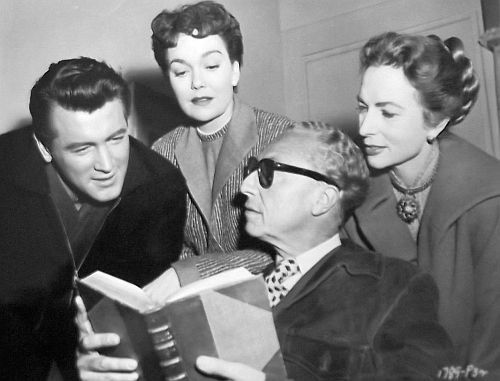 [Douglas Sirk was born April 26, 1900. Here’s a review of the 2019 Blu-ray of Tarnished Angels.]
[Douglas Sirk was born April 26, 1900. Here’s a review of the 2019 Blu-ray of Tarnished Angels.]
Douglas Sirk’s last interview may have been the one conducted by Kathryn Bigelow and Monty Montgomery for Interview magazine in the early 80s, just before or just after the great director of melodramas went blind.
Kathryn Bigelow: You’ve been quoted as saying that you learned to trust your eyes more than words. That the angles are the director’s thoughts, the lighting is his philosophy.
Douglas Sirk: The director has to control everything. The movement of the camera is important because this is his style. Otherwise he just becomes a director of the people. With film, a director should be in on everything. Never give up and don’t let them tell you they are the spe- cialist. You don’t want any special kind of work, you want your kind of work. You see, a film is a visual thing. It’s not being told by words alone. Words are important, but almost to a minor degree. It’s the lighting, the angling, and it’s the cutting, too. I’ve always been from the first to the last minute, in the cutting room telling the cutter I want it this way and that way, because once in a while you take a whole sequence out of here and put it there and that makes a lot of difference. Believe me, maybe it will make the film.
There’s also an epic assay at Bright Lights Film Journal by Jane and Michael Stern, about a two-week visit they made in 1977 to Lugano, Switzerland to meet Sirk and his wife, Hilde. (“Sirk on Sirk” stands alongside “Melville on Melville” as a model of extended conversation between directors and well-prepared journalists.)
I treasure my years-ago memories of two of the three shorts he made late in life teaching film in Germany, the Fassbinder-starring Bourbon Street Blues (1978) and the serene, stunning Tennessee Williams adaptation, Talk to Me Like the Rain (Sprich zur mir wie der Regen, 1975) (based on Williams’ short play, “Talk to Me Like the Rain and Let Me Listen”). Someday, these crisp shorts ought to resurface. For the moment, a couple of bits of scene-setting from the Sterns’ extended introduction, followed by one extended disquisition by Sirk on his experiences with art and commerce in his career as a European theater director, and then as an American studio hand. “Swooshing up the elevator shaft of Condominio Vall’Orba in a mirrored elevator to meet Sirk: He is still Sirk, never Douglas. Not yet anyway. You search your mind for an appropriate image of him. There are few to choose from: black and whites on the back of a book, a few auteurist articles with pictures decades-old, showing a man with a tweed jacket, piercing pale blue eyes and wavy hair. He is awesome-looking, aloof. Best forget these pictures… We eat at the Grotto, a favorite restaurant, a restaurant only Douglas Sirk would take you to, where Rock Hudson might take Jane Wyman.
“There is a warm Italian innkeeper, there are soft-hued walls, a special pasta, a flow of Chianti. Douglas impetuously drinks wine and eats roast pork. We know this is a special time for all of us. We have fallen in love with Douglas and Hilde… He is describing Lana Turner’s work in Imitation of Life. He describes their rapport. But one listens too casually,  relaxed as with an old friend, and the mind wanders. But something strange starts to happen. You are off-guard. The old man starts to direct. He is showing you how he manipulated Lana Turner in her scenes. But instead of the Golden Goddess, he is doing it to you. The hooded blue eyes unfurl, revealing beneath the lids an unquenched intensity. They fix on you, the voice hypnotically cajoles and shames. “You like that, don’t you? You like that feeling,” he asks seductively. “Well, then, you are a fool!” Back and forth, changing your face, pulling the adrenalin to the surface. You aren’t an actor, so what is to explain these emotions shooting through you as he talks? You remain riveted, in confusion accepting the reality that you are now seated twelve inches away from Sirk the director on a couch somewhere far away from home. Douglas has vanished, and has been replaced by two ice-blue eyes and a commanding voice.
relaxed as with an old friend, and the mind wanders. But something strange starts to happen. You are off-guard. The old man starts to direct. He is showing you how he manipulated Lana Turner in her scenes. But instead of the Golden Goddess, he is doing it to you. The hooded blue eyes unfurl, revealing beneath the lids an unquenched intensity. They fix on you, the voice hypnotically cajoles and shames. “You like that, don’t you? You like that feeling,” he asks seductively. “Well, then, you are a fool!” Back and forth, changing your face, pulling the adrenalin to the surface. You aren’t an actor, so what is to explain these emotions shooting through you as he talks? You remain riveted, in confusion accepting the reality that you are now seated twelve inches away from Sirk the director on a couch somewhere far away from home. Douglas has vanished, and has been replaced by two ice-blue eyes and a commanding voice.
You sit stiffened, the bones in your spine locked together until a hoarse laugh and a cough end the game. Sirk has receded and there again is Douglas, leaning back into the cushions on the couch, offering you a piece of cake.”
In Magnificent Obsession, Rock Hudson has a line: “As far as I’m concerned, Art is just a guy’s name.”
SIRK: “Exactly! In Hollywood, the producers said, “Never say Art. Nobody wants to know about it.” Arty is okay, but Art is for crazy painters, or sculptors, or what-do-I-know. Now after the war, we were looking for something completely different. Artaud’s essay in ‘The Theater and Its Double’ describes a completely new era for the theater. It explains simply, “No more masterpieces,” for God’s sake, no more Art. We are really not interested. Together with Marxism, this was to be something populistic—this is different from the American term populism. It would be something the average man could understand, but with something additional—style. There arose a belief in  style—and in banality. Banality encompassed politics, too, because it was a common belief that politics were not worthy of art. As a theater man, I had to deal with high art. I would play farces and comedy to make money, and classics for the elite. But we were trying to escape the elitaire. So slowly in my mind formed the idea of melodrama, a form I found to perfection in American pictures. They were naive, they were that something completely different. They were completely Art-less. This tied in with my studies of the Elizabethan period, where you had both l’art pour I’art and you had Shakespeare. He was a melodramatist, infusing all those silly melodramas with style, with signs and meanings. There is a tremendous similarity between this and the Hollywood system—which then I knew from only far away. Shakespeare had to be a commercial producer. Probably his company or his producer came to him and said, “Now, look, Bill, there’s this crazy story—ghosts, murder, tearing the hair, what-do-I-know. Completely crazy. It’s called Magnificent Ob… no, Hamlet it was called. The audiences love this story, Bill, and you have to rewrite it. You’ve got two weeks, and you’ve got to hold the costs down. They’ll love it again.” So, my God! A director in Hollywood in my time couldn’t do what he wanted to do. But certainly, Shakespeare was even less free than we were. But let’s go deeper into drama. How was it with the ancient Greeks? I have studied pieces of the Periclean period, and all of them are crazy situations. But there is a difference there. The role that style plays today was then taken by religion. Take Oedipus, for instance. The Freudians don’t like this, but in reality Oedipus is a detective story, a mystery, nothing other than that. The mother thing, the complex, is bullshit, because he didn’t know. He’s not guilty, really. It’s sheer melodrama, for the masses. Now I talked with Brecht about this, and I told him that it was religion that made such crazy melodrama possible for the ancient Greeks. That, of course, is not possible any more. He agreed. But he was at a complete dead end. L’art pour I’art offered nothing, so finally he escaped into Marxism. There is no doubt that this is what made it possible for him to continue. It was politics that made his art possible, as religion did for the Greeks. Now my idea of the melodrama he carried into the “drink and smoke theater,” where there was nothing sacred. The idea was, Let’s forget, for God’s sake, the word Art. In this theater, there is really something going on. Beer is served; you meet a few whores. Of course, we were conjuring the Elizabethan theater. Slowly into my program in the theater I was sneaking in the melodrama—popular plays—and I discovered they were making lots of money. At the time I belonged to the socialist party, and Hitler came to power. The intellectuals were all saying, “Give him a year. Give him two years. It will all blow over. He’ll go away.” I wanted to escape. But what did I know? I knew Law, and I knew theater. I didn’t, of course, know American law, and in America the theater did not exist, except for Broadway. But America to us—especially to Brecht—was raw and rough. That was our idea of it—boxing, triviality, banality, killing, and the American melodrama, which was the American cinema. This goes for Stroheim, for Sternberg. All of it was melodrama; but in their hands, given a style. When Brecht was there he tried to sell his ideas as a literary man, which didn’t work. Not in America. And for movies he had no feeling. He was not a visual character. He didn’t see. In his movie scripts he didn’t catch movie style or technique. It was only theater. Furthermore, he insisted on his Marxist way of thinking. Of course, McCarthyism finished any possibility of that.”
style—and in banality. Banality encompassed politics, too, because it was a common belief that politics were not worthy of art. As a theater man, I had to deal with high art. I would play farces and comedy to make money, and classics for the elite. But we were trying to escape the elitaire. So slowly in my mind formed the idea of melodrama, a form I found to perfection in American pictures. They were naive, they were that something completely different. They were completely Art-less. This tied in with my studies of the Elizabethan period, where you had both l’art pour I’art and you had Shakespeare. He was a melodramatist, infusing all those silly melodramas with style, with signs and meanings. There is a tremendous similarity between this and the Hollywood system—which then I knew from only far away. Shakespeare had to be a commercial producer. Probably his company or his producer came to him and said, “Now, look, Bill, there’s this crazy story—ghosts, murder, tearing the hair, what-do-I-know. Completely crazy. It’s called Magnificent Ob… no, Hamlet it was called. The audiences love this story, Bill, and you have to rewrite it. You’ve got two weeks, and you’ve got to hold the costs down. They’ll love it again.” So, my God! A director in Hollywood in my time couldn’t do what he wanted to do. But certainly, Shakespeare was even less free than we were. But let’s go deeper into drama. How was it with the ancient Greeks? I have studied pieces of the Periclean period, and all of them are crazy situations. But there is a difference there. The role that style plays today was then taken by religion. Take Oedipus, for instance. The Freudians don’t like this, but in reality Oedipus is a detective story, a mystery, nothing other than that. The mother thing, the complex, is bullshit, because he didn’t know. He’s not guilty, really. It’s sheer melodrama, for the masses. Now I talked with Brecht about this, and I told him that it was religion that made such crazy melodrama possible for the ancient Greeks. That, of course, is not possible any more. He agreed. But he was at a complete dead end. L’art pour I’art offered nothing, so finally he escaped into Marxism. There is no doubt that this is what made it possible for him to continue. It was politics that made his art possible, as religion did for the Greeks. Now my idea of the melodrama he carried into the “drink and smoke theater,” where there was nothing sacred. The idea was, Let’s forget, for God’s sake, the word Art. In this theater, there is really something going on. Beer is served; you meet a few whores. Of course, we were conjuring the Elizabethan theater. Slowly into my program in the theater I was sneaking in the melodrama—popular plays—and I discovered they were making lots of money. At the time I belonged to the socialist party, and Hitler came to power. The intellectuals were all saying, “Give him a year. Give him two years. It will all blow over. He’ll go away.” I wanted to escape. But what did I know? I knew Law, and I knew theater. I didn’t, of course, know American law, and in America the theater did not exist, except for Broadway. But America to us—especially to Brecht—was raw and rough. That was our idea of it—boxing, triviality, banality, killing, and the American melodrama, which was the American cinema. This goes for Stroheim, for Sternberg. All of it was melodrama; but in their hands, given a style. When Brecht was there he tried to sell his ideas as a literary man, which didn’t work. Not in America. And for movies he had no feeling. He was not a visual character. He didn’t see. In his movie scripts he didn’t catch movie style or technique. It was only theater. Furthermore, he insisted on his Marxist way of thinking. Of course, McCarthyism finished any possibility of that.”
SIRK ONCE REMARKED, “The angles are the director’s thoughts. The lighting is his philosophy” is very close to Murnau: “They say that I have a passion for ‘camera angles’… To me the camera represents the eye of a person, through whose mind one is watching the events on the screen. It must follow characters at times into difficult places, as it  crashed through the reeds and pools in Sunrise at the heels of the Boy, rushing to keep his tryst with the Woman of the City. It must whirl and peep and move from place to place as swiftly as thought itself, when it is necessary to exaggerate for the audience the idea or emotion that is uppermost in the mind of the character. I think the films of the future will use more and more of these ‘camera angles,’ or as I prefer to call them these ‘dramatic angles’. They help to photograph thought.” This is what Sirk did in the boldest, most outrageously stylized moments of his commercial successes of the 1950s: how transparent can I make this and not condescend as a European intellectual to American life? (The cover of “Sirk on Sirk” comes from the last shot of Written on the Wind. Joseph H. Lewis placed daring sexual imagery in pictures like Gun Crazy and The Big Combo, but this takes the ache.)
crashed through the reeds and pools in Sunrise at the heels of the Boy, rushing to keep his tryst with the Woman of the City. It must whirl and peep and move from place to place as swiftly as thought itself, when it is necessary to exaggerate for the audience the idea or emotion that is uppermost in the mind of the character. I think the films of the future will use more and more of these ‘camera angles,’ or as I prefer to call them these ‘dramatic angles’. They help to photograph thought.” This is what Sirk did in the boldest, most outrageously stylized moments of his commercial successes of the 1950s: how transparent can I make this and not condescend as a European intellectual to American life? (The cover of “Sirk on Sirk” comes from the last shot of Written on the Wind. Joseph H. Lewis placed daring sexual imagery in pictures like Gun Crazy and The Big Combo, but this takes the ache.)
Reid Rosefelt was at a screening Sirk attended long ago. “One of things that is so great about Sirk is how he has inspired so many filmmakers to adapt and shape his work to their own talents. During the Q&A, somebody asked him, “Mr. Sirk, what do you think makes a good director?” Sirk stopped to think and then answered quietly: “Making movies is very hard. Very hard. In my opinion anyone who makes a movie… is a good director.” I’ve always loved that he said that. It was so unexpected. If he had said the usual baloney I would never remember it today. Most people would find the idea crazy, ridiculous, filled with false humility, or even dangerous, but if you had been there, you would have known he was absolutely sincere.”

Two valuable pieces from Senses of Cinema: one-and-a-two. (Ray Pride)
Oscars-Netflix: Sean Baker
2/3 This would help keep theater owners and audience members who appreciate the theatrical experience satisfied.
— sean baker (@Lilfilm) March 3, 2019
3/3 Just an idea with no details ironed out. But we need to find solutions like this in which everybody bends a bit in order to keep the film community (which includes theater owners, film festivals and competitive distributors) alive and kicking.
— sean baker (@Lilfilm) March 3, 2019
“i program an art house cinema in a small, midwestern town…”
my issue w/@netflix as a distro is that as a matter of biz philosophy, it doesn’t allow most of its original movies to be booked by theaters who reach out & specifically request to screen them. we essentially had to beg to screen MUDBOUND and ROMA in our cinema. 2/17 pic.twitter.com/MBJj5pSDeW
— brit freeze (@midwesttisbest) March 2, 2019
but plz also allow theaters, esp. non-profit art houses, to share these works w/our communities. we've cultivated audiences who look to us to present interesting/transformative cinematic experiences. we want @netflix originals to be a part of this mix. why doesn’t netflix? 4/17 pic.twitter.com/CGVQjQF7WO
— brit freeze (@midwesttisbest) March 2, 2019
as a cinema located on a college campus, even tho we are the only bricks-and-mortar art house in our town & regularly sell out screenings of new & rep releases, many distros consider us "non-theatrical," putting us in same category of venues as churches, prisons & libraries. 6/17 pic.twitter.com/zASRX4jdtU
— brit freeze (@midwesttisbest) March 2, 2019
film distributors who consider us non-theatrical won’t let us book their films at all or will make us wait 3 mos. after initial release in “real” theaters to book b/c we're "not a part of their release strategy." i thought the "strategy" was to get ppl to see your film? 8/17 pic.twitter.com/JwcsJdt4Rk
— brit freeze (@midwesttisbest) March 2, 2019
there is a good deal broken about the U.S. theatrical distribution system. but, i see/live it every day & i know the theatrical experience is not dying. and to be certain, some film distributors get it so right! they understand it's about SHARING STORIES NOT WINNING AWARDS. 10/17 pic.twitter.com/8kwW1uvsr1
— brit freeze (@midwesttisbest) March 2, 2019
and we happily co-exist w/VOD, steaming services & home video releases. we don’t want to prevent or slow down any of the sea change in theatrical distribution that’s allowing more access to so many to produce & enjoy more films. 12/17 pic.twitter.com/jLbprdHinA
— brit freeze (@midwesttisbest) March 2, 2019
our cinema’s vision statement is: TRANSFORMATIVE CINEMATIC EXPERIENCES ACCESSIBLE FOR ALL. to that end, we're committed to offering half (or more) of our programs for free. the majority of the other half is <$7. we want everyone to have access to great film from everywhere. 14/17 pic.twitter.com/ETt2vkuWjH
— brit freeze (@midwesttisbest) March 2, 2019
Oscars-Netflix: Paul Schrader
Via Facebook: “THE NETFLIX DEBATE. I have no animus against Netflix. Ted Sarandos is as smart about film as any studio exec I’ve ever met. Distribution models evolve. The notion of squeezing 200+ people into a dark unventilated space to see a flickering image was created by exhibition economics not any notion of the “theatrical experience.” Netflix allows many financially marginal films to have a platform and that’s a good thing. But here’s my query: it involves FIRST REFORMED. First Reformed was sold at a bargain price to A24 out of the Toronto FF. Netflix, which could have snapped it up as easily as it swats a fly on its ass, passed. As did Amazon. As did Sony Classics and Focus. But A24 saw a commercial path for this austere aesthetic film. As a result First Reformed found a life. A24 rolled it out through festivals and screenings from 2017 to 2018. And it survived. Not a big money maker but profitable for A24 and a jewel in their crown. Would First Reformed have found this public acceptance if Netflix and scooped it up (at say twice the price A24 payed) and dumped it into its larder? Perhaps Bird Box and Kissing Booth can fight their way through the vast sea of Netflix product to find popular acceptance, but First Reformed? Unlikely. Relegated to film esoterica. A different path? My proposal: For club cinemas (Alamo Draft House, Metrograph, Burns Center, Film Forum) to form an alliance with a two tiered streaming system (first tier: Criterion/Mubi, second tier: Netflix/Amazon).Distribution models are in flux. It’s not as simple as theatrical versus streaming.”
2 Comments »Oscars-Netflix: Alfonso Cuarón
Variety’s morning-after-Oscar director exit interview of Alfonso Cuarón includes this sentence: “’I wanted to explore some family wounds,’ Cuarón says as he slices into a wedge of avocado toast.”
Of greater moment, to the Netflix-Oscar conversation: “The conversation about theatrical is super-important. I’m a filmmaker. I believe in the theatrical experience. But there has to be diversity. The multiplex theatrical experience is a very gentrified experience. You have one kind of product with few variations. It’s hard to see arthouse films. It’s hard to see foreign films. Most theaters play big Hollywood movies.
“There needs to be greater diversity in how we release our films. Distribution models need to be more flexible, depending on the film,” Cuarón continues. “You cannot impose the release strategy of a tentpole film on a smaller film. You may need fewer theaters and longer runs or models in which the so-called window is shorter. We’re thinking in one single paradigm. It’s a moment to start opening up paradigms. Right now it’s a confrontation between economic models. It’s not like one model benefits cinema, and the other does not.”
Oscars-Netflix: Spielberg
[hides behind fence graphic]
Spielberg is totally right about the theatrical thing ≠ Spielberg is awesome in general— Joshua Rothkopf (@joshrothkopf) March 2, 2019
One of the ironies in the Spielberg/GREEN BOOK/ROMA situation, which I raised in this week’s Screen Talk, is that many of us got an early taste of cinema by watching…Spielberg movies…on VHS. https://t.co/DyLNt1OtXu
— erickohn (@erickohn) March 2, 2019
It’s possible that Steven Spielberg doesn’t know how difficult it is to get movies made in the legacy system as a woman or a person of color.
In his extraordinary career, he hasn’t exactly produced or executive produced many films directed by them. https://t.co/i88BrApzR8
— Franklin Leonard (@franklinleonard) March 2, 2019
How many independent filmmakers rented out a theater for a week out of pocket to get their films qualified for this idiotic, devalued award that still means a lot for careers? This whole thing stinks of elitist exclusion and bad faith. https://t.co/vHJUyz30AP
— Walter Chaw (@mangiotto) March 3, 2019
One award-season rule change a source told me Spielberg wants is director-related: he wants the DGA's feature prize to only allow movies that have a four-week exclusive theatrical window. That would have disqualified Cuaron (and most other Netflix films).
— Steven Zeitchik (@ZeitchikWaPo) March 3, 2019
Where were you the day the Netflix Wars erupted? pic.twitter.com/GjxstIMmfT
— Monica Castillo (@mcastimovies) March 3, 2019
I have read every single Netflix vs Spielberg take on here and I think the only reasonable response is that we do away with the Oscars PROBLEM SOLVED
— Alison Willmore (@alisonwillmore) March 3, 2019
Oscars-Netflix: Aleš Kot
The VHS player would make rounds and so would the tapes, and they’d gradually become worn out. Most American movies (unless they were censored/blocked) only ran in cinemas in the few (3) big cities, and only for a short window. Nobody knew anything.
— Aleš Kot (@ales_kot) March 2, 2019
We just wanted to see the movies, whatever the distribution, legal or not, cinema or not. We just wanted to see other worlds were possible.
I don't have any solutions for the whole Academy/Netflix debate. But the above is what it made me come back to.
— Aleš Kot (@ales_kot) March 2, 2019
Thirty-Seven 2018 Screenplay PDFs
Roma.
Roma. (En español)
Spider-Man: Into the Spider-Verse.
Vice,
2 Comments »





